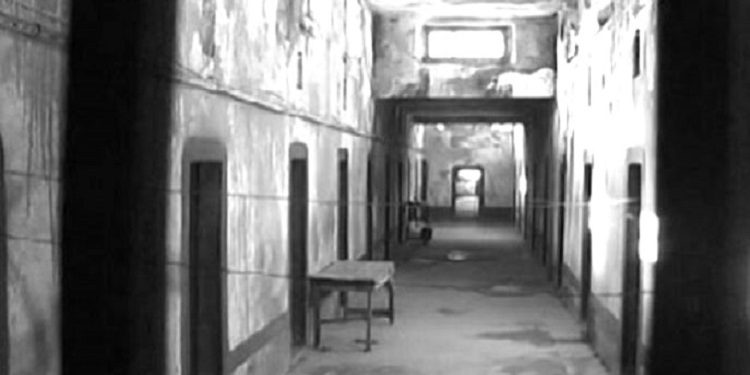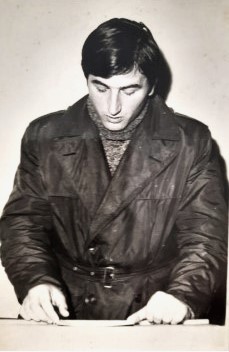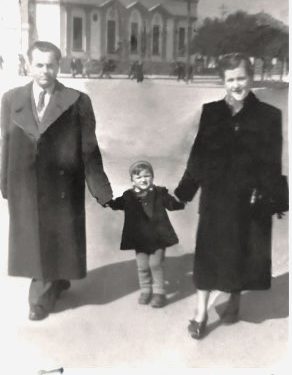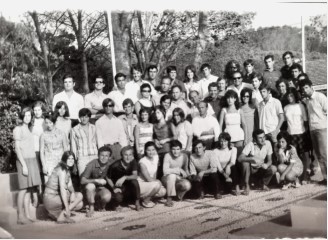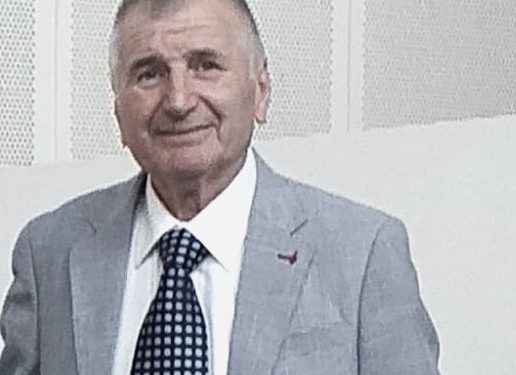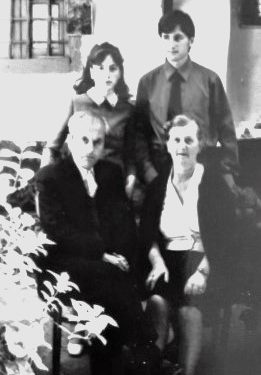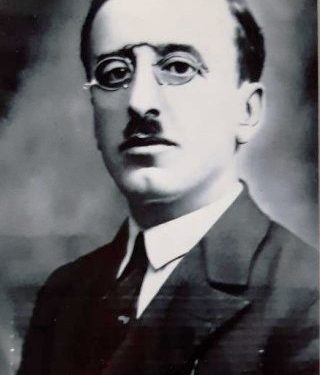By Nestor Topencharov
Part eight
THE DRAMA OF LIFE
(THE STORY OF A FAMILY)
I dedicate this book to: All fellow sufferers. Their families. And in particular, to people who did not have the opportunity to tell the odyssey of life, during the communist dictatorship.
FOREWORD
Memorie.al / I were born in the city of Korça, on October 22, 1953. I left Albania in October 1990, after we were given the right to repatriate to Yugoslavia (now North Macedonia). In June 1992, I immigrated to Italy, where I still live today. Although I have been away for 32 years, I did not cut ties, as Albania was the country of my birth, where I spent 37 years, and that part of my blood is Albanian. Years later, the ties with Albania were strengthened, as I also took my wife from Durrës. We came every year on vacation, but the short time of our stay meant that many contacts were cut off. However, true friends and comrades remained forever in my heart.
In the last three years, I did not have the opportunity to visit Albania. But during 2022, I came several times. My commitment on the one hand and the coincidence on the other, made it possible for me to re-establish connections with friends and colleagues whom I had not seen for decades. Knowing my past, some of them advised me to write down what had happened in my life. At first, this idea seemed like a utopia to me, since even though I had been a good student; I had no inclination towards drafting. Then I reflected. I would just write my story, true events, where not much inspiration was needed. Perhaps a writer would know how to present these events, as a true pen artist knows. While I will write them, without many descriptions: briefly, simply, naked, as they happened.
Something else that pushed me even more to write this book was an interview on TV Klan, which I saw in October of this year, directed by the well-known journalist Blendi Fevziu. I didn’t seek revenge. But I didn’t even have justice. With the help of this book, I will make known to the Albanian public opinion, the role of the individuals who contributed to my suffering and that of my family. And today, I am putting my finger on these “beings”, not for the task they had, but for the way they performed it. I will start my writing with my grandfather, from my mother’s side, to continue with my father, where I will touch on the most important moments of their lives. This will help the reader to know my background.
Then I will also talk about myself. In this book I will also tell some events, one more dramatic than the other, that happened to people I had the honor of knowing. I am glad that many books have been published on the suffering and persecution of “enemies of the people” and their families in internment camps and prisons during the communist dictatorship. I was able to read some of these works. I believe that this book, in a modest way, will contribute to know even more the inhumane methods of the State Security, the way they created accusations and how they destroyed people and families to keep the people under terror.
Author
December, 2022
CHAPTER TWO
In the morning, after the dungeon door was opened, the plate was placed on the floor and Haxhiu poured the tea with a large aluminum kettle, without bending down. Sprinkles of water with burnt sugar were scattered everywhere. With the tea they gave you a piece of bread, which often fell like a bullet in your stomach. For lunch, they gave us a bowl of bean juice, other times, soup with herbs and potatoes (only the name was such that if a piece of potato fell on you, you were lucky). Sometimes, soup with a few grains of rice or pasta, as the case may be. Perhaps it was a good thing that the dungeon environment was semi-dark. This helped not to see well the “special food” that we were going to eat. This menu was always accompanied by a piece of black bread. It was the same for dinner. There was only tomato sauce in abundance. Often, not long after lunch, they would bring us dinner. Generally at 16.00, dinner was eaten.
In the period after the sentence, one afternoon after dinner, the dungeon gate opens and Haxhiu, after taking me out into the corridor, asked me if I wanted to wash the dishes. I immediately agreed. The first for the human way, as he asked me, and the second, I would stay for 10-15 minutes, in an environment with better air than the dungeon. Next to the bathrooms was a long cement post, where there were several water taps, where we washed our faces and hands in the morning. They also left some pieces of laundry soap there. I started washing the dishes, quickly passing the soap and rinsing them. Then I also washed the spoons and put them on one side of the post office. I finished work quickly. I noticed Haxhi’s satisfied face. This became for me a daily chore, an operation that was repeated three times. I noticed that after a few days, the dishes started to become cleaner. The red color of the sauce began to fade.
In the middle of May, the decision came from the Supreme Court, where I was given the same sentence. He could do to happen, even add it. After the final sentence, they left me in the dungeon for another month. Apparently, they were not satisfied with the months I had been doing. When I was 8 months old, I was transferred to dungeon. Dungeon was a very large room, with plenty of space to walk around. More light and air came in through the windows. There were also some mattresses, which, although they were in pieces, helped to sleep better.
Life in the dungeon was quite different. There were always about 15-20 people. The organic of the room was constantly changing. Some were sent away, others were brought along with their stories. Then, in that dungeon, only I was for politics, the others ordinary. Most for pickpocketing or, socialist wealth. The pickpockets were all young boys. They were not impressed by the environment, which they knew well. Their funny conversations made you forget where you were for the moment. Almost the majority had their second or third arrest.
One of them, Ilka, told me how he used to leave Korça with 3-4 friends and that they carried out their activities on trains. When people boarded and disembarked, or when there were enough people standing in the wagons, they skillfully “relieved” them from their wallets. They moved somewhere else, took the money, and threw away the wallet with some documents. Later after meeting everyone, they divided them equally. But this was not all the value, as they hid a part of it. They did this not to gain more money, but to protect themselves from the accusation of someone who could cooperate with the police in the future. These guys had become real professionals.
On both sides of the wall, where the door of the vat was, there were a large number of aluminum gourds. I remember, because we had one in the dungeon as well. Here in the dungeon, on one side were those of urine and on the other of drinking water. All the gourds were very stinky. Who knows how many times they could have switched places from one side to the other. On certain days, twice a month, the prisoners’ families brought the change and the little food that was allowed. One kg. sugar, a piece of white cheese, or crackers, cookies and cigarettes. In the corridor was a shelf without a lid, with many compartments, where, based on the number of the dungeon, you put the bag of food. A little sugar and some biscuits served to enrich the morning tea. A small piece of cheese, to accompany lunch or dinner. Many of these young people did not have their families. Sometimes, I shared a little of what I could with someone. They respected me, not only as a schoolboy, but also as a convicted politician.
One afternoon, before our dinner, I saw 3-4 of them gathered together. It seems they were planning something.
When it was our turn to go out and they took us out into the corridor, they started teasing each other and thus attracting the attention of the policemen, who laughed at them. The rest of us continued the line in the bathroom. After we performed the actions, they closed the gate and brought out the other bucket. At this point, the group gathered. One took out a bag, which he had hidden under his T-shirt. There was a large piece of kachkavalli, which they quickly divided between them, and in the blink of an eye, they devoured it. Immediately after, the bag was torn and made into thin strips, which they put under the floorboards, after removing a piece that served as a stopper.
Apparently it wasn’t the first time. Then the dungeons started, when I heard a voice complaining. After a while, our gate opens and the policemen enter, who start asking the young people where they hid the horse. They acted like they didn’t know anything. After searching through the body, they moved the mattresses and blankets, but failed to find any signs. One of them pointed to the other casket, where, of course, they couldn’t find anything there either. Then, Haxhiu’s angry voice was heard shouting at them.
During the evening, all water reserves were exhausted and the boys were thirsty. As the kachkavalli looked, it had been very salty. They started knocking on the door and asking for a drink of water. Even though I was in a tragic situation, I was still laughing at what was happening. It seemed to me that these guys were playing some kind of comedy. The internal policeman could not open the gate because it was not allowed, based on the regulation, and besides, the keys were in another closed room, with a door with bars. After a few hours, apparently, the outside policeman came, who took someone from the dungeons, for the investigator. By this time the knocking on the door and the demands from the cow had become very loud. After they finished working with the dungeon, our door was opened and the young people were given the opportunity to quench their thirst.
From the beginning of July I was taken out (almost after 9 months), for airing and to take a shower. It was a beautiful sunny and hot day. The large square next to the palace, where our dungeons were, was surrounded by high walls and behind the walls on the street side, there were two places where policemen with automatic weapons stood. On one side, there were several showers. These too, like toilets, without doors. We were ordered to undress and enter the shower two by two. I felt great pleasure when the warm water touched my body. I started to use the soap on my head and then on my body, which hardly foamed up.
I noticed the flayed skin of the body falling in pieces along with the soap scum and water. After the shower, my body was relieved. I tried to drain most of the water, because I was going to get dressed and towels, they had not given us.
After a few days, they took me and took me to the house of another palace. This room was smaller than the previous one, but there was lighter and I was the first to enter, after the walls were painted and the general cleaning done. After me, they brought the professor of language and literature, Gaqo Peci, and the painter, Vangjush Tushi. Then two young boys from the villages of Korça. They were also sentenced to 7 years in prison for agitation and propaganda.
One was called Parparim and had a ballistic grandfather, while the other, Yzeir, came from a poor family. As they exited, the room was filling up. I took my place in the corner, opposite the door. Gaqon was next to me. Vangjush was placed on the other side of the wall, near the two boys. Apparently, I thought, I was removed from the previous camp, so that I wouldn’t infect others, but here, I could see that we were all “enemies”.
At that time, Gaqo was also sentenced in a group with the painter, who was in the camp with us, and with the music professor, Kiço Venetiku and his sister. Kiço had been given 25 years in prison, also accusing him of being an agent, since someone from Yugoslavia, whose name was unknown and who had never met him again, in 1946, had asked Kiço for the map of the Korça airfield. Others were given 10 years for agitation and propaganda. We knew Gaqo as a family and spent a lot of time together, talking. He was a cultured man. He told me about his arrest.
One day he received a telegram from the Faculty of Linguistics, inviting him to a conference. When he got off the train, two men were waiting for him, who invited him to get into their car to accompany him. At first, the professor was surprised, because in the past, they had never come out to meet him by car. It had felt good, though, for the honor they were doing him. “Gaz” described the main boulevard (today “Zogu i Parë Boulevard”), passed the center and entered “Elbasan Street”. At first Gaqo thought they were taking him to a hotel, then maybe to the faculty. But even this was not the stop, as “Gaz” started to stick to Kërraba. He still didn’t understand what was happening to him. In fact, he had not seen the license plate of “Gaz” and his suspicion was getting stronger. In an instant the car braked hard. A small herd of sheep had blocked his way. The short, fat man sitting next to the driver expressed his regret that three people would have lost their lives.
At this moment, Gaqo had taken advantage of the break of silence and corrected the mistake of the speaker:
– “There are four of us in the car.”
Then the head of the investigation, Reshat, turns back and says:
– “You are an enemy and you are arrested in the name of the people”.
Immediately, the Security employee, who was by his side, put the irons on. They took him to the dungeon, to the branch of Pogradec, where they kept him for several weeks. There they tied him with chains and put a motorcycle helmet on his head, after a suicide attempt. During that time, the family did not know what had happened and they only informed them when they returned him to Korça. During the investigation, Gaqo did not admit anything. He was surprised. It showed me the fantasy of the Security, in creating accusations and imaginary nicknames. They told him that, when he went to Venetic’s house, he addressed Kiço, with; “Lord Sand”.
I remember the expression of his face and especially his eyes, which clearly expressed his strong reaction against these slanders.
As for Vangjush, I also knew him well from family. We were related on my mother’s grandfather’s side. Until 1966, when the name day was celebrated, my parents took me with them. I remember his paintings, in the hall where visitors were expected. Some were of large dimensions. He had also written books, one of which was on the life and work of Vangjush Mio, another great Korça painter. Tushi had been an honored and appreciated man in the field of art. In recent years, a neurodegenerative disease (Parkinson’s disease) had hit him hard. But this did not stop his arrest and conviction. I was very sorry, not only for his age, but also for his serious health condition. One of his hands was constantly shaking and it prevented him from eating. He also had difficulty walking.
With Kiço, we were in the same auto-prison when we were transferred to Tirana. In Tirana prison, when we were stripped to be searched, I was horrified by his thin legs. Only the bones remained. It was said about someone, when he was weak: “bones and skin”. But in Quichua, I saw only bones. After two hard years in the dungeon and without any help.
I knew Professor Kiço as a face, since the “Themistokli Gërmenji” gymnasium, where I studied, was in the same building as the music school, where he taught. He was an honorable and presentable man. They said that one of his students was taken as a witness. She was reluctant to testify during the trial. Then Kiço had intervened to give her the courage to speak, since she was a young girl and had a future ahead of her.
Both Kiço, his sister, and Vangjushi, passed away without seeing freedom. As for Gaqo, I met him several times after prison.
One morning the door of the prison opens and a new prisoner is brought in. He was a small man, but very energetic. I made room for him in the corner, next to me. His name was Pirro Frashëri. A few days after they met, they cut their hair. Now we were all the same. After learning my story, he told me that there were four brothers and one sister. The father had been the commander of the gendarmerie in the Korça district, from the time of Zog, until the end of the war. His father had finished his studies at the Military Academy in Egypt. He was a patriot and loved his people. When the country was invaded, he remained in charge, to preserve peace and public order from thieves, robbers, and murderers. When the partisans entered Korça, they arrested him, along with many important personalities of the city. They sentenced him to many years in prison, which he spent in the Maliqi swamp and other labor camps. A few years after his release, he passed away.
After the arrest of his father, Pirros, who was only 5 years old at the time, had his house and everything else confiscated. Together with the family, accompanied by a cart with some loot, they were transferred to a shack, in a neighborhood of Korça, which was called the “Tower of Grace”. Anyone from Korça knows what neighborhood it is about.
The passing years were very difficult for Pirro and his family. As he grew older, his hatred for the communist regime grew more and more every day. His desire was to contribute to the downfall of this system. Although still a minor, Pirro fled to Greece in 1953, where he sought to make his contribution. After a few months, they send a courier to a base in the Përmet area. This family played a double game. They denounced Pirro and then escaped.
Pirro, 14 years old, was sentenced to 15 years in prison for being an agent. After serving his sentence, he started working at the construction company in Korça. The security kept him constantly under control, as a dangerous person, for the communist regime. The dictatorship was not enough for all those years in prison that that young man had done. After a while, they prepared the plan.
They provoked him at work and immediately arrested him for insulting him. During the investigation, they tried to recruit him. When the Head of the Branch asked him:
– “How do you understand life”?
Pyrrhus’ answer had been strong and clear:
– “To live honestly”.
After these significant words, the president ordered the head of the investigation to change the article. From insults, to hitting the official person.
Pirro is sentenced to 6 years in prison and 5 years of exile. After serving the second prison term, he was exiled to the deep highlands of Korça, where he worked in the exploitation of forests, in sawmills.
During all these years, even his brothers had not left him alone. They had been and were going through prisons. The older brother, who lived in Tirana, had served prison terms for agitation and propaganda. The two brothers of Korça, Aliu and Skenderi, were imprisoned for escape attempts and agitation and propaganda. Memorie.al




